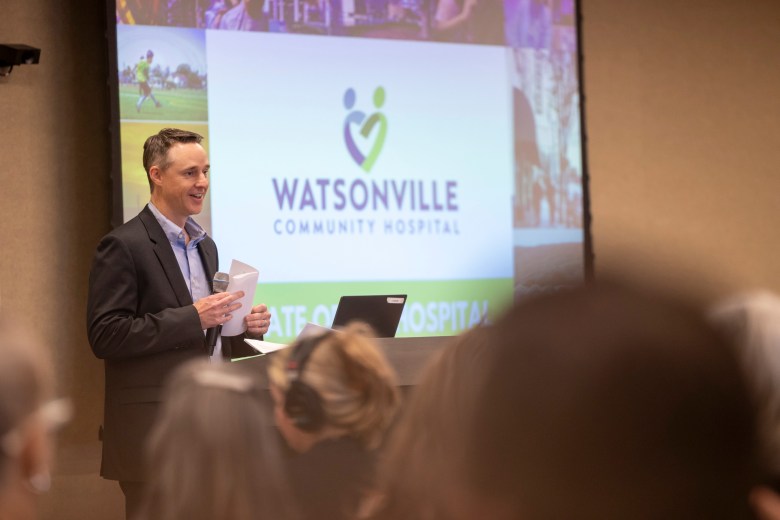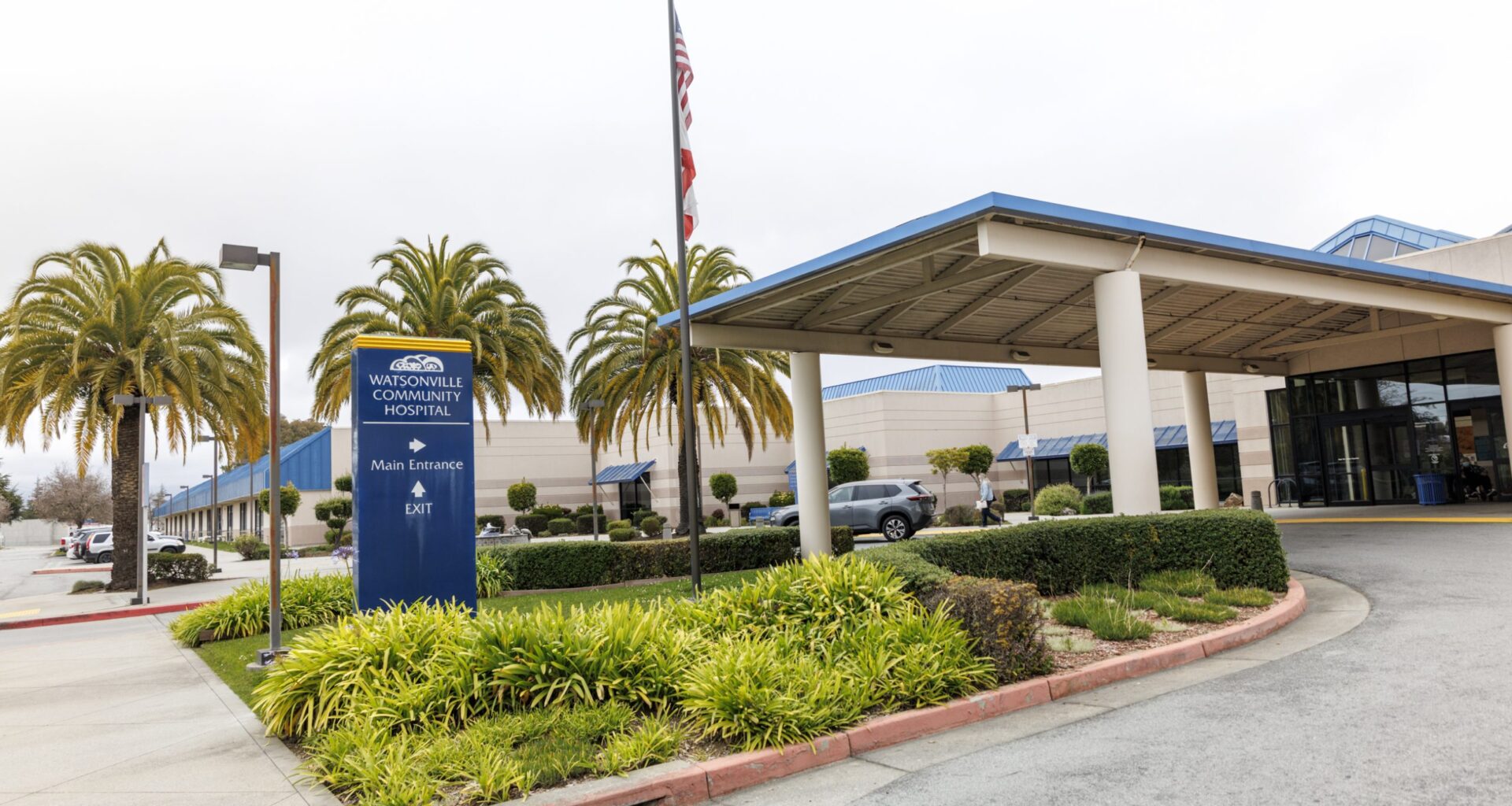Quick Take
After purchasing its land and facilities last year through a $116 million voter-approved bond, Watsonville Community Hospital now faces up to $8.4 million in annual losses from federal Medicaid cuts. The public hospital is speeding up a search for a health care partner to manage operations and avoid a financial crisis.
Bracing for a severe drop in revenue following the passage of sweeping federal spending cuts, Watsonville Community Hospital is exploring partnerships with regional health care providers to help manage the hospital’s day-to-day operations to keep its finances afloat.
Last month, the Pajaro Valley Health Care District board of directors — which oversees the hospital and its operations — created an ad hoc committee to continue exploring the idea of establishing partnerships with other health care providers in the region.
One of the reasons, if not the primary reason, for the hospital to seek out a partnership to help cover its operational costs is the impending cuts to reimbursements from Medicaid and Medi-Cal — the state-funded insurance, said hospital CEO Stephen Gray. Funding for Medicaid will be cut by nearly $1 trillion under the “One Big Beautiful Bill Act,” passed by Congress in July.
The cuts, according to Gray, will create massive funding gaps for hospitals that serve a lot of patients insured by Medicaid and that are already operating on thin financial margins, like Watsonville Community Hospital.
Gray told Lookout the hospital will lose between $3.3 and $8.4 million a year for the next three years as a result of federal spending cuts. “And those are conservative numbers. They could very well be higher,” he said.
On top of these cuts, Gray said the quality assurance fee program might also be on the chopping block by the federal Center for Medicare and Medicaid Services, which could further affect the hospital’s revenue. The program provides supplemental payments to hospitals that serve Medicaid and uninsured patients.
 Watsonville Community Hospital CEO Stephen Gray speaks during the State of the Hospital event in April. Credit: Kevin Painchaud / Lookout Santa Cruz
Watsonville Community Hospital CEO Stephen Gray speaks during the State of the Hospital event in April. Credit: Kevin Painchaud / Lookout Santa Cruz
Watsonville Community Hospital benefits greatly from the program, said Gray, as it takes in a high percentage of government-insured patients. He added that a decision on those cuts won’t happen until December or early next year.
The hospital and its board are specifically looking to partner with nonprofit health care providers or government agencies that are familiar with the region, said hospital board chair Tony Nuñez.
Ideally, the partnership would preserve and enhance the services available in the region through the hospital, and make those financially sustainable, said Gray. Structurally, he said, he’s not sure what the partnership would look like yet, as the hospital is having ongoing discussions with potential partners.
A large health care provider could, for example, propose to take over all of the hospital’s operations, said Nuñez. The health care provider would essentially run the day-to-day operations, and also work with the health care district on strategic planning for a fee.
Some health care districts do have a revenue-sharing system in place, where a certain percentage of hospital revenue goes toward the district and the rest to the health care provider, which could be an option for Watsonville, he said.
A partnership brings a lot of benefits depending on whom the hospital partners with, said Gray. It could bring in more specialists to the facility, which would in turn bring more surgeries and other services that would bring more money to the hospital, he said.
From a service standpoint, the hospital could potentially increase the types of procedures it offers because it has better access to physicians and specialists, Gray said. Partnering with a large health care provider could also help improve the hospital’s balance sheet by allowing it to negotiate better rates with insurance companies and better prices for supplies, things that are much harder to do as a small independent hospital, he said.
The hospital board established 10 guiding principles — essentially, what the board is looking for in a partnership — at its special meeting last week, said Nuñez. Some of the guidelines include honoring existing union contracts and that the health care district “must maintain ownership of all real and personal property assets throughout and after the term of any arrangement.” Last year, the health district was able to purchase the hospital buildings and land from its previous owners after voters passed a $116 million bond to support the facility.
The board wants to make its guidelines as broadly as possible in order to give the hospital an opportunity to explore different options, Nuñez said. “We’re really open to a bunch of different options right now,” he said.
The most likely reality, said Nuñez, is that Watsonville Community Hospital will enter a partnership with a large health care provider that will bring the hospital into its network of care. It might be easier for the provider to bring in its own team to direct daily operations, he said. This would also allow the hospital to access a large pool of funds that it can pull from to offset potential losses due to federal funding cuts.
Gray told Lookout that when the hospital first became independent, it didn’t have a large “rainy day” fund to dip into in case of an emergency or sudden loss of revenue. Additionally, the hospital hasn’t really had the chance to build up those funds, and with these cuts, it’s in need of help, he said.
The hospital was close to breaking even, cutting its losses to $100,000 last year, said Gray. Then, last fall, the hospital fell victim to cyber attack, which affected its finances because it could not bill patients right away. Additionally, Gray noticed there’s been a decrease in patients in the emergency department, likely due to immigration fears.
Nuñez added that a partnership with a larger health care provider was always in the books for the Watsonville hospital, it’s just happening sooner than expected. Gray said the hospital’s strategic plan outlined the potential need for a partnership to help continue operating long term.
 Watsonville Communty Hospital board chair Tony Nuñez. Credit: Kevin Painchaud / Lookout Santa Cruz
Watsonville Communty Hospital board chair Tony Nuñez. Credit: Kevin Painchaud / Lookout Santa Cruz
“It’s hard for a small, independent hospital to be fully effective, particularly when you live in an area where you’re taking care of a lot of government-insured people,” Gray said.
The hospital has already received four proposals from health care providers in the region: Salud Para La Gente, Sutter Health, Kaiser Permanente and CommonSpirit Health, which manages Santa Cruz’s Dominican Hospital, said Nuñez.
Salud Para La Gente, which runs 13 health service sites across Santa Cruz County and in northern Monterey County, proposed partnering with the hospital on human resources systems and services. CommonSpirit and Sutter Health offered similar proposals to run and manage the hospital. Kaiser Permanente proposed leasing out a space on the facility’s first floor and providing specialty care from there. Watsonville Community Hospital is Kaiser’s affiliated hospital in Santa Cruz County. Patients insured by the health care provider are able to access services at the hospital and other clinics in the county.
Nuñez said the board will revisit some of these proposals again to see if any of them would be a good fit for what the hospital needs. He also added the hospital has started discussions with UC San Francisco, too.
Both Gray and Nuñez told Lookout the hospital and its board do not have a specific timeline for when they expect to finalize a partnership with a health care provider, but said leadership is trying to be proactive as possible.
“We understand that we have to be prepared heading into 2026 for everything that’s going to happen to health care,” Nuñez said.
Have something to say? Lookout welcomes letters to the editor, within our policies, from readers. Guidelines here.
